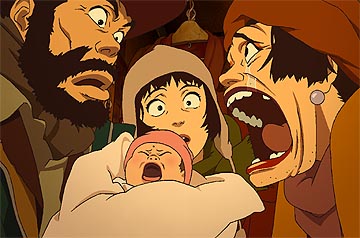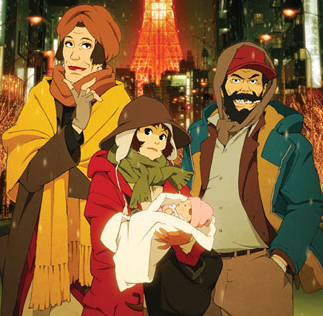Kon isn't as popular a name as, say, Hayao Miyazaki, whose wondrous films Spirited Away, Princess Mononoke, Kiki's Delivery Service and My Neighbor Totoro have given him at least some stateside recognition. Still, Kon has produced some popular pieces of anime in recent years including Perfect Blue and Millenium Actress (which would have put him on the map had DreamWorks not bungled a recent North American release). Kon's latest comedy/drama only goes to prove that feature-length animation is useful as more than just babysitting material, Happy Meal fodder and a dumping ground for mediocre Sting songs.
Tokyo Godfathers, written and directed by Kon, is a sly, contemporary reimagining of the 1948 John Wayne/John Ford Western Three Godfathers. Actually, the story was originally conceived in a novella by prolific pulp writer Peter B. Kyne. It had been filmed several times before Ford got hold of it and has been reimagined many times since (including, most recently, as the 2002 computer-animated film Ice Age). The gist of the story is this: Three drifters find a baby and embark on a quest to return it to its rightful mother.
Kon has set the story in modern-day Tokyo and has chosen for his trio of heroes a middle-aged bum, a homeless transvestite and a young runaway girl. (Nope, this ain't no Disney film.) These impoverished street dwellers have all been swept into the same gutter and have formed an impromptu family. One day—Christmas Day, as fate would have it—while sifting through their nightly bounty of curbside trash, the trio finds an abandoned baby. Hana, the slightly delusional transvestite, views the child as a gift from God. Gin, the grumpy alcoholic, does his best to dissuade Hana's illusions of instant motherhood. Miyuki, the underage runaway, tries to be an apathetic youth, but clearly the abandoned child awakens memories of her own aborted homelife.
Following a slim set of clues (a locker key, a photograph, a newspaper ad) our homeless heroes decide to trek across the snowy environs of Tokyo and find out who would abandon a newborn in such a callous and untimely manner. Almost immediately, it seems as if there's a certain divine providence working in their favor. Searching for leftover food offerings in a cemetery, the group stumbles across a child's grave festooned with diapers, a feeding bottle and some milk. The convenient coincidences continue to mount as our three not-so-wise men (and not entirely men either) get closer to solving the mystery of their nameless charge.
Over the course of their quest, we come to know the backstories of these three street dwellers and the often-surprising circumstances that brought them to their present condition. More often than not, these circumstances clash with the self-pitying personas they've created for themselves.
From start to finish, Tokyo Godfathers is marked by a unique, magical realist perspective. Comparable, perhaps, to another holiday favorite, It's a Wonderful Life, Tokyo Godfathers asks us to believe in a lot of tiny miracles. By time the film reaches the feel-good synchronicity of its climax, most viewers will be all too happy to suspend disbelief.
Kon's animation lacks the fluid, watercolor wonder of Miyazaki or the fine line precision of Katsuhiro Otomo (Akira). His style is simple but effective—not too cartoonish in its characters and thoroughly exacting in its haunting cityscapes. Kon's depiction of Tokyo deftly mixes the romantic with the realistic. This could, arguably, have been a live-action film; but Kon's subtle tweaking of reality gives it a layer of fantasy that live-action just couldn't sustain.
Though filmed with whimsy, hope and wry humor, the script never shies away from confronting the darker aspects of modern society—as when Gin is attacked by a group of callow, bat-wielding youths. The crazy genius of this film is that even that harrowing encounter is just another necessary link in the chain leading our characters to their ultimate redemption. Mixing the overstated Gin Alley realism of William Hogarth with the serendipitous whimsy of O. Henry may seem odd, but Tokyo Godfathers pulls it off.




